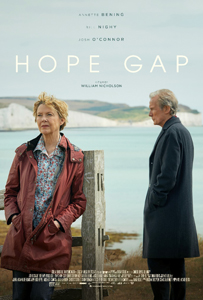“Hope Gap” — A Marriage Crumbles
 When Annette Bening and Bill Nighy are featured in a film examining the dissolution of a marriage, expectations are high. In “Hope Gap,” there are truths presented, questions to be parsed, and beautiful seascapes featuring white cliffs. Yet, something remains off.
When Annette Bening and Bill Nighy are featured in a film examining the dissolution of a marriage, expectations are high. In “Hope Gap,” there are truths presented, questions to be parsed, and beautiful seascapes featuring white cliffs. Yet, something remains off.
The opening interior scenes feel like a filmed play. Conversation and actions have the quality of being typically British (Bening adopts an English accent), but before long, this viewer got the feeling that I’d been dropped into “Who’s Afraid of Virginia Woolf?”
It’s clear early on that the characters of Grace and Edward are operating on different wave lengths. Despite the outwardly comfortable scene of two adults at their respective computers, with one making tea for the other — the dialogue reveals Grace’s dissatisfaction and Edward’s resignation to the ongoing routine. Grace works on her anthology of poems; Edward diligently edits and re-edits Wikipedia entries — an activity that Grace casually dismisses.
Grace presents as acerbic, to the point of bullying her husband. Trying to elicit some form of enthusiasm from Edward about planning a dinner celebration for their impending twenty-ninth anniversary, the interaction quickly devolves from passive aggression to pure aggression on the part of Grace.
It is revealed that Grace has always been trying to get Edward to be more emotionally available. Resorting to outrageous and physical behavior in an attempt to extract some evidence of feeling from him (“I want a real reaction.”), she is met with an infuriating low-key response from Edward. He states matter-of-factly, “You want something I haven’t got.”
The narrative is “inspired” by writer and director William Nicholson’s experience with the end of his parents’ marriage. (The script was adapted from Nicholson’s play.) Their son, Jamie, (Josh O’Connor, who will be recognized by PBS fans) is a twenty-something who lives alone in London, with relationship issues of his own.
Jamie is used as a go-between by both Grace and Edward. The difference in their world views and attitudes is reflected in how they relate to their son. Grace longs for regular weekend visits; Edward is somewhat detached, stating flatly, “He has a life of his own.”
Williamson said that in developing the text, he wanted to delve into the psychological impact of a divorce on an adult child. He said, “If you’re grown up and your parents split up, it makes you rethink the basics of your childhood.”
We see a flashback through Jamie’s memory. He is a very young child at the family’s favorite beach spot, the cove of Hope Gap. He is happily swinging between each parent, holding their hands.
However, the signs of an imperfect match have been in place for a long while. When Edward explains to his son the circumstances of how he met Grace, he reflects on the marriage as a probable mistake from the beginning.
There is another woman, and has been for a year. She is the mother of a student that Edward had been giving additional instruction to. It’s not something that he went looking for, or a crazy midlife fling. Rather, it’s the comfort and refugee in a partner who is willing and able to accept him for exactly who he is.
Edward invites Jamie home for a Saturday, with the express purpose of having him there when he announces his departure to Grace. A bag is packed and he’s ready to leave. Echoing the history lesson Edward had retreat from Moscow: “The weak had to be abandoned so that the strong could survive.”
Jamie tries to act as a support to his two parents, who both use him callously. Yet, the upheaval is also a wake-up call for him. He begins to examine how elements of his mother’s and father’s behavior have set him up to potentially repeat negative emotional patterns.
Beyond being an analysis of a marital breakup, there is a clear focus on how children are influenced and impacted by the life choices that their parents make.
In the beginning of the movie, it appears that Grace is the realist in the marital equation. She knows something is missing, but really doesn’t have a clue. For her, the “marriage isn’t dead.” Bening plays her role without vanity, as she navigates the emotional breakdown of the partner who had previously appeared fully in charge.
As Edward transitions into a new relationship, Grace and Jamie are forced to move forward, until they arrive at the other side. Along the way they recognize, in their own respective fashions, that letting go isn’t easy.




I loved Hope Gap. The acting was superb! I truly enjoyed every minute of it.